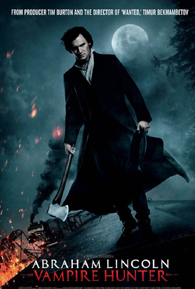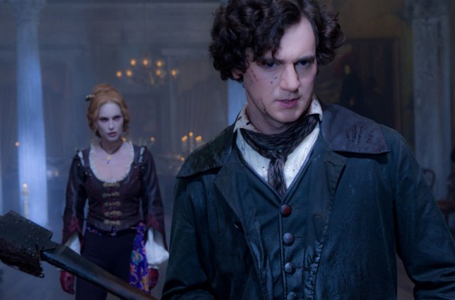
This film fulfils literally what it promises – scene after sumptuous scene of Abraham Lincoln fighting vampires – and none of the irony and cheekiness its premise implies. Instead of tediously repeating what have been said elsewhere about this film's technical brilliance, entrancing CGI sequences, and excellent direction, and about how this film is a one-idea premise that doesn't take it to its logical conclusion, we'd rather celebrate the outrageously cheeky irreverence that was absent in the film.
I am not, nor ever have been, in favour of bringing about in any way the social and political equality of men and vampires, that I am not nor ever have been in favour of making voters or jurors of vampires, nor of qualifying them to hold office, nor to intermarry with human beings; and I will say in addition to this that there is a dietary difference between men and vampires which I believe will forever forbid the two races living together on terms of social and political equality...
Modern advocates of marriage equality take pride from the fact that in all 50 states and one federal territory of the United States of America, the union between vampire and human has gained acceptance in such a remarkably short time. It is as though overnight, the dark shadows of one and a half centuries of bigotry clothed in pseudo-religious arguments against 'miscegenation' have been banished by the better angels of our nature. Sure it took a rock star to come out as a vampire in 1985, and for a controversial and at one point ill-fated vampire-human romance and vampire-werewolf turf war to capture the attention and empathy of this nation. As a new generation coming of age, we'd hardly blink our eyes at the thought of accepting vampires as our neighbours, friends, colleagues, and even lovers and partners for life.
Because of these irreversible and significant gains of the modern civil rights movement, we often forget that the Civil War was a particularly trying time for vampires. In Abraham Lincoln: Vampire Hunter, the age-old story of the war pitting brother against brother is told anew. Caught up in Abraham Lincoln's crusade against the Southern states, which he waged long before he attained any political office or became the nation's 16th president, vampire society was literally torn apart by ideals no less noble – and suffered greatly for it. Lincoln's financier and mentor, a certain Henry Sturgess, was a vampire on the Unionist side. He is our hero, an advocate of assimilation of the minority vampires into dominant human culture, but he also advocated a genocide of the Southern vampires. And yes, he's the good guy. Pitted against him was Adam, whose real estate deals with plantation owners was to be the foundation of a free, independent state of vampires, by vampires, for vampires. Yet as a loser of the war and a vampire who wanted to revive traditional vampire culture and advocated the Christmas holiday replacement we know as Kwaanza, we know him as a villain. But lest we forget, today's United Nations would clearly acknowledge and sanction his project for a vampire homeland under the principle of self-determination. And yes, this incredibly nuanced battle of hearts, minds, and ideals does make a recent series of international spats between a Charles Xavier and an Erik Lensherr look like child's play.
The film delves into how heroism and villainy exist in equal portions, that every leader is at best a misguided idealist at best or a well-intentioned extremist at worst. Controversial? Perhaps, since it does throw a light onto Lincoln's famous political and personal ambiguities: as a simultaneous abolitionist and friend of vampirekind, he was loathe to acknowledge the common humanity of vampires and was the father of the separate but equal doctrine, which has kept vampires at the lowest rungs of society in the South for a century after he 'won' the South.
There are no easy answers. I'd like to end with a plea from the recently deceased and very troubled Rodney King, a tragic figure whom some of you will know as the first black vampire: Why can't we all just get along?












 Printable Version
Printable Version



















Reader's Comments
Be the first to leave a comment on this page!
Please log in to use this feature.